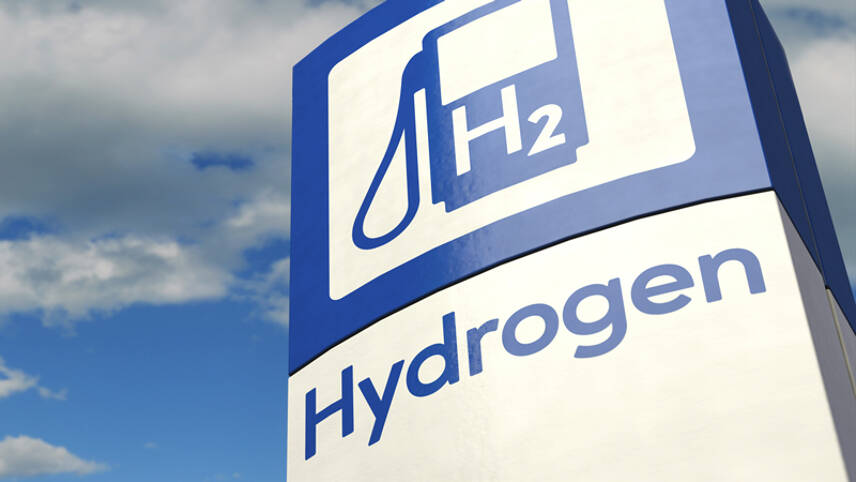WOBO thanks “edie” for the range of news items available for its membership.

UK Government forges ahead with green hydrogen for industry, backs 20% blends in gas grid
The UK Government has thrown its weight between 11 green hydrogen generation and use projects spearheaded by businesses in England and Scotland. It has also made a strategic decision on hydrogen blending in the gas network, touting a ‘limited’ role.
The Department for Energy Security and Net-Zero (DESNZ) has confirmed 11 green hydrogen projects to benefit from funding through its Hydrogen Production Business Model today (14 December).
These projects cover 125MW of new renewable hydrogen production capacity collectively. Hydrogen produced will be used in hard-to-abate industrial processes; funding has been firmed up for Sofidel to switch to a hydrogen-gas blend for paper milling in Port Talbot, while the InchDairnie Distillery will switch to a pure hydrogen boiler.
The Distillery will be served by hydrogen produced in the Cromarty Firth by Storegga and ScottishPower. Storegga’s hydrogen managing director Sarah Potts said the decision will enable a final investment decision to be taken in 2024 and first production to begin in 2026.

https://go.iesve.com/manufacturing-webinar/edie
Empowering Net-Zero Manufacturing: Digital Insights and Funding Opportunities for Industrial Buildings
February 6th 2024, 2pm – 3pm GMT
With the much anticipated Industrial Energy Transition Fund (IETF) Phase 3 set to launch in January 2024, and a recent influx of funding announcements geared towards the decarbonisation of energy intensive manufacturing facilities, the time has never been better explore the technologies and funding support available to accelerate your decarbonisation action plan. Join us for this free webinar to learn more about the technology and funding application support available from IES to deliver successful net-zero and energy cost saving strategies across manufacturing facilities. Alongside a live technology demonstration, our expert team will discuss the latest IETF funding guidance, and provide an overview of the various decarbonisation feasibility, energy optimisation and monitoring and verification (M&V) studies that IES can provide to support relevant funding application requirements and deliver on broader energy efficiency and decarbonisation objectives.

EU Parliament and member states reach deal on corporate due diligence law
After an all-night discussion late last week, negotiators of the EU Council and Parliament agreed a compromise deal on the Corporate Sustainability Due Diligence Directive (CSDDD), including the most controversial aspects of the inclusion of finance and the obligation to implement climate plans.
Proposed by the European Commission in February 2022 after pressure from the European Parliament, the CSDDD aims to hold big companies responsible for violations of human rights and environmental standards in their value chains.
“This law is a historic breakthrough. Companies are now responsible for potential abuses in their value chain, 10 years after the Rana Plaza tragedy,” said Lara Wolters, the member of the European Parliament who led the negotiations for the Parliament.
According to Richard Gardiner, EU policy head at the World Benchmarking Alliance (WBA), the CSDDD “gives companies a clear legal mandate that they must address the human rights and environmental harms across their upstream and downstream supply chains.”

IEA: Coal demand reached record high in 2023, but structural decline on the horizon
Global demand for coal reached a record high this year, breaking the previous record set in 2022. But the International Energy Agency (IEA) is now forecasting a decline through 2026, with coal displaced by renewables.
The Agency has today (15 December) released its latest annual report on the state of the global coal market, confirming that demand increased by 1.4% year-on-year. This is considerably lower than the 3.8% increase recorded last year.
According to the IEA, the EU and the USA each decreased their coal demand by 20% year-on-year. But this procress was offset by increased year-on-year demand in Asian markets, including India (8%) and China (5%).
The IEA sees this as a temporary trend, with these markets seeking to maintain energy security amid a dip in hydropower output due to early and intense heatwaves.
In the next three years they are expected to bring significant renewables online in other formats, including solar. China is expected to account for more than half of the world’s renewable energy generation capacity expansion through 2026 by the IEA’s forecasts.

UK to launch carbon border tax regime in 2027
Goods that the UK imports from nations with a lower carbon price will face a new climate levy from 2027, the Treasury has confirmed. This is one year later than originally expected.
The UK’s Carbon Border Adjustment Mechanism (CBAM) was originally meant to enter a reporting phase in 2024 ahead of a 2026 launch.
But the Treasury confirmed on Monday (18 December) that Mechanism will launch in 2027. This is likely to be a year later than the EU.
Britain’s CBAM levies will apply to imports from high-carbon and hard-to-abate sectors including steel and aluminium, cement and ceramics.
Additional products may be added to the scope of the CBAM following additional consultations in 2024. Initial consultations
The Treasury is set to apply the levy on a sliding scale. Charges applied will depend on the greenhouse gas emissions generated in the production of the goods, plus the gap between the UK’s carbon price and the price applied in the country of origin, if any.

Scotland increases landfill tax, confirms sharp rise in offshore wind budget
The Scottish Government delivered its annual Budget on Tuesday (19 December) and, while the main focus has been on an income tax hike to plug shortfalls, there are some significant announcements included for the nation’s green economy.
Under pressure to address a multi-billion-pound Budget shortfall, Scotland’s Deputy First Minister and Finance Secretary Shona Robinson announced a council tax freeze but an increase in income tax to 45% for anyone earning between £75,000 and £125,140 annually.
This change is expected to raise £18.8bn in 2024-25, with Scotland touting a £1.5bn uplift than if it had maintained alignment with the UK Government’s tax brackets.
Less fanfare was made around the Scottish Government’s spending plans to support its 2045 net-zero target and aims on nature and the circular economy – but there were some notable announcements.

European nations including France and Germany pledge clean power systems by 2035
Seven European countries, collectively responsible for around half of the EU’s power generation, have pledged to bring CO2-emitting power plants offline by 2035 or to retrofit them with carbon capture.
France, Germany, the Netherlands, Austria, Belgium, Luxembourg, and the Netherlands pledged their support to the 2035 commitment late on Monday (18 December).
In doing so, they followed the lead of the UK, which made this commitment in October 2021.
Germany had already committed last year to eliminating CO2 from electricity generation by 2035. France and Italy then made the same commitment as part of a G7 agreement.
The seven nations are set to jointly plan infrastructure to make sure that they build enough grid capacity and energy storage in the right places. This will help to maintain energy security as more intermittent renewables come online.

Michael Gove orders ‘rapid review’ of planning system to fast-track energy projects and homes
Communities Secretary Michael Gove has ordered a three-month ‘rapid review’ of the planning system in a bid to shorten consultation times for projects including housing developments and energy generation projects.
Gove announced the decision at a Royal Institute of British Architects (RIBA) meeting on Tuesday night (19 December), and his Department confirmed this more widely on Wednesday morning (20 December).
Sam Richards, who served as energy and climate policy advisor to Boris Johnson, has been selected to spearhead the review. Richards is currently advisor to the Britain Remade campaign group which he co-founded earlier this year to lobby for measures to grow the economy by accelerating infrastructure development.
He has been tasked with identifying “unnecessary delays” and presenting recommendations for policy interventions to Gove, plus Chancellor Jeremy Hunt, in early 2024.
